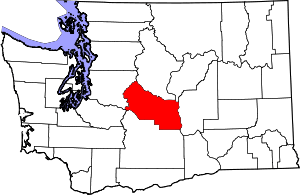Martin, Washington
Martin is an extinct town in the northwest United States, in Kittitas County, Washington. The GNIS classifies it as a populated place;[1] Stampede Pass is near to the west.
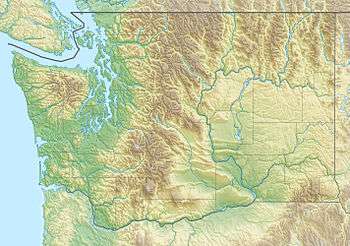

Name
The town was named Martin because of the nearby Martin Creek. The creek was originally named Pine-Marten Creek because an American marten was killed nearby.[2]
History
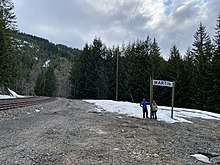
Railroad
Construction
Prior to the Stampede Tunnel, to reach the Puget Sound region from east of the Cascades, Northern Pacific Railroad trains had to pay for trackage rights on the Oregon Railway & Navigation Company tracks from Wallulla, Washington along the Columbia River to Portland. After that a car ferry across the Columbia returned trains to NP tracks north to Tacoma (1873) and eventually Seattle (1884). To avoid paying for trackage, NP decided a better path to the Puget Sound region was over the Cascades.[3]
NP engineers spent from 1873-1884 narrowing down the candidate passes for crossing the Cascades to three: Snoqualmie, Stampede, and Natchess [4]. The NP railroad had left Lake Superior and arrived in Yakima in 1885. At risk of losing millions of acres of land grants for failure to build a direct line to the Puget Sound, NP put out bids to drill the Stampede Tunnel in just 28 months. They opened the bids on Jan 21, 1886 and the lowest bidder was Nelson Bennett at $837,250, nearly half the price of most bidders.[5] They awarded him the contract on Jan 29th. On February 1st, the first wagonload of supplies left Yakima for the tunnel site. It took months to arrive as an army of men felled trees and built plank roads over which to haul the machines and supplies.[4] [6]
Once the caravan arrived, they set up their sawmill and used the lumber to build bunkhouses, stables, a machine shop, warehouses, a hospital, a restaurant, a saloon, a steam plant, and the station house. The construction camp was called Tunnel City and from 1886 to 1888 it housed over 200 construction workers who were building switchbacks and drilling the tunnel. [7][6][4][5] Up the hill towards the Stampede Pass summit, 1,000 Chinese laborers who were also working on the tunnel were encamped.[3]
In April 1886, under pressure from increasing OR&N through rates, NP decided to also build a temporary switchback over Stampede Pass. The route left the main line at the Martin station and rejoined the main line at the west end of the tunnel. The switchback was completed June 1, 1887. Passenger service began a month later on July 3rd and Martin was station No. 1894. [8] [9]In the month of September, 1,900 cars were moved over the switchback line.[5]
During the winter months heavy snow up to 10' deep would cover the line. In July 1887 snowsheds were constructed along the line including at Martin. The snow sheds were built of 10"x12" posts and 10"x16" caps and covered with 4" planks. In January 1888, a pair of Leslie rotary steam snow shovels arrived to keep the switchback line cleared.[5]
On May 14, 1888 the tunnel bore was completed, just 7 days ahead of the contracts deadline. On May 28th the tunnel opened for traffic. The switchback route was used for a few tourist trains and then abandoned.[5][3]
Decline
At the height of the steam era, NP employed operators 'round the clock at Martin.[3] Martin was an important post in coordinating train movements through the single-track tunnel. Trains were authorized by the dispatcher and timetable.[10] Over time, train engines switched to diesel and the number of men needed in Martin shrank. In 1921, Martin was at mile post 46.5 (0 was at Ellensburg) on the Seattle Main Line.[9] In 1928, all that remained of Tunnel City was a station house labeled Martin and a few employee cottages.[11]
In 1947, Martin was station No. 7023 at milepost 82.5 on the Tacoma Main Line.[12]
In February 1949, Martin saw 3 ft (0.91 m) of snow fall the night of February 15th. The snow depth increased from 13 ft (4.0 m) to 16 ft (4.9 m) overnight. The crew of 124 men (100 more than usual) tasked with keeping the line open with two rotaries and a plow could not remember a worse time.[13]
In 1957 or 1958, NP installed a small CTC board at Easton to automate control traffic through the tunnel.[10][3] In April of 1960, Northern Pacific Railway removed trains No. 5 and No. 6, discontinuing passenger service to Martin.[14] In 1963 they automated the Martin station and in the summer of 1964 they demolished all their buildings at Martin.[15][16][3][11] The railroad subsequently abandoned their telephone lines and telephone cabins.
Abandonment
After NP merged into Burlington Northern in 1970, BN had several parallel routes across the Cascades. The Stampede route was relegated to a secondary. In 1977 a storm swelled Stampede Creek and it washed out the railroad tracks. Trains did not run again until 1978.[7] On August 13, 1983, BNSF Railway discontinued the 78-mile line through the Stampede Tunnel but did not abandon the right of way. In July 1988, vandals stealing the copper from power transmission lines dropped a line near the eastern portal of the tunnel at Martin and set the wooden structure ablaze. The fire was put out by volunteers but the tunnel and hundreds of feet of track were destroyed.[7][3]
Restoration
In 1995 Burlington Northern purchased Sante Fe and became BNSF. In 1996 they announced plans to spend $125 million to restore the Stampede Pass route. Soon 500 workers fanned out to install 145,000 concrete ties, 158,000 wood ties, and 47 new miles of rail. A new concrete snowshed was constructed at the Martin portal of the tunnel and in December rail service once again passed through Martin.[3][17]
In 2019, BNSF added a signal tower at Martin that enables them to run double-length (230 cars) grain trains through the Stampede Tunnel. The longer trains have locomotives in the front, middle, and rear to prevent string-lining.[18]
Access
The Palouse to Cascades State Park Trail crosses FS 54. Get off at FS 54 and head west. Follow FS 420 west to the end.
Winter
Access in the winter is from the Crystal Springs Sno-Park. Forest Service road 54 is split groomed for tracked snow machines on the north side and non-motorized (skiers, sled dogs, etc.) on the south side.
Summer
Vehicle access to Martin is via exit 62 off I-90. Take FS 54 to FS 420. Follow FS 420 road to the end.
Recreation
Ski Touring
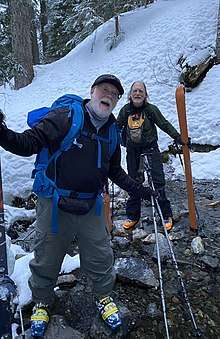
Starting in the early 1920s, skiers from Cle Elum[21] and Puget Sound would ride the Northern Pacific Railroad to the Martin, Washington stop. The railroad supplied "cozy warm shelter" in a dozen specially equipped bunk-cars and meal cars on a side track at the Martin station.[22] Skiers could stay overnight and the railroad provided heating stoves and free coal.
Meany Lodge
In 1928, The Mountaineers built the Meany Ski Hut on 54 acres of Tunnel City, a 5 minute walk from the Martin rail stop.[11] The hut was subsequently expanded and still operates as Meany Lodge.
Martin Ski Dome
In 1939, the Northern Pacific Railway opened a ski area on the eastern portal of the Stampede Tunnel called Martin Ski Dome.[23] It was located just across the railroad tracks from the Meany Ski Hut and closed in 1942 with the start of World War II. It was subsequently sold and operated as the Husky Chalet from 1944 thru the 1949 ski season.[24]
Sno-Park

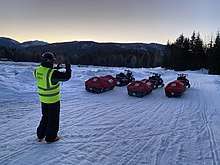
The Crystal Springs Sno-Park is located just off Exit 62 on I-90. Managed by the Lake Easton State Park, it provides access to the snow sports trails around and through Martin. The Sno-Park has plowed parking lots for non-motorized (skiers, sled dogs) users, motorized (snowmobiles & other tracked vehicles) users, and overnight guests to Meany Lodge & Trollhaugen.
Erling Stordahl
The Erling Stordahl trailhead is just minutes away from the Crystal Springs Sno-Park. The flat easy trails are built and maintained in partnership by the Sons of Norway and the Ski for Light charity. They are specifically for the benefit of blind skiers but are open to all.[25]
Trollhaugen
A few more minutes up the dual groomed (x-country on the South, snowmobile on the North) Stampede Pass road is the Cascade Sons of Norway lodge Trollhaugen.
John Wayne
Just over a half mile North of the Sno-Park, the Stampede Pass road crosses the Palouse to Cascades State Park Trail. Prior to 2018, the trail name was the John Wayne Pioneer Trail and was part of the Iron Horse State Park Trail. The trail is groomed in the winter and is well used by skiers.[26] In the summer bikers, hikers, and horse riders use the trail.
Sled Dogs
About a mile up Stampede Pass road the non-motorized (skiers, sled dogs) trail follows Forest Road 420 on the left and motorized (snowmobile) traffic stays right. These x-country ski trails are groomed by a grooming machine named Hippo owned by the Mountaineers and operated by their volunteers. This area is also where the Northwest Sled Dog Association holds their annual Crystal Dog Challenge on the groomed trails that pass through the area.
At the end of the 420 Road is the historic location of Martin and the Meany Lodge ski resort.
See Also
- Keechelus Lake
- Martin Ski Dome
- Meany Lodge
- Palouse to Cascades State Park Trail
- Stampede Pass
- Crystal Springs Sno-Park
References
- U.S. Geological Survey Geographic Names Information System: Martin, Washington
- Meany, Edmond S. (1923). Origin of Washington geographic names. Seattle: University of Washington Press. p. 160.
- Kelly, Bruce. "Washington's Stampede Pass: BNSF bets millions on Cascade crossing". Trains. November 1997 (November 1997): 42–50.
- Holbrook, Stewart (1947). The Story of American Railroads. New York: Crown Publishers. pp. 199–206.
- Schneider, Allan. "The Stampede Switchbacks". The Mainstreeter. The Northern Pacific Railway Historical Association. 17 (2): 5–20.
- Phillips III, John A. "A Short History of Lester and Stampede Pass". Retrieved 2020-04-06.
- Little, Walt. "Chronological History of Meany Lodge". Meany Lodge. The Mountaineers. Retrieved 2020-03-31.
- NPRHA02. "Station Roster of 1899 - Martin". Research the Northern Pacific. Northern Pacific Railway History Association. Retrieved 2020-04-08.
- Curtiss, Paul. "NP Station Roster April 1 1922 - Martin". Research the Northern Pacific. Northern Pacific Railway History Association. Retrieved 2020-04-08.
- Cooley, David J (2008). Stampede Pass: BNSF's Comeback Route. Auburn, WA: Sonrisa Publications. pp. 24–25.
- Kellogg, Idona (1978). The Mountaineer 1978: Meany Ski Hut Celebrates Fifty Years. Seattle, Washington: The Mountaineers. pp. 80–88. Retrieved 2020-04-20.
- Thompson, Peter. "NP Station Roster of 1947 - Martin". Research the Northern Pacific. Northern Pacific Railway History Association. Retrieved 2020-04-08.
- "Stampede Sees Railroading at Its Toughest". The Seattle Times. 16 February 1949. p. 11.
- Skoog, Lowell. "Mountaineer Annual, 1961". Mountaineer Annual, 1960-69. Alpenglow Ski Mountaineering History Project. Retrieved 2020-04-05.
- Lundin, John. "Skiing at Martin, the Northern Pacific Stop at Stampede Pass". HistoryLink.org. HistoryLink.org. Retrieved 2020-03-31.
- Little, Walter. "Lodge Reports: Meany Lodge". Mountaineers.org. The Mountaineers. Retrieved 2020-05-07.
- Wilma, David. "Burlington Northern Sante Fe Railroad reopens Stampede Pass line on December 5, 1996". historylink.org. History Link. Retrieved 2020-04-06.
- Kelly, Bruce. "BNSF testing double length trains". Railway Age. Simmons-Boardman Publishing Inc. Retrieved 2020-04-20.
- "Post Offices". Jim Forte Postal History. Retrieved 14 August 2016.
- Willhite, Eric. "Martin Lookout & the Stampede Tunnel". willhiteweb.com. Retrieved 2020-04-06.
- Skoog, Lowell. "Cle Elum Miner-Echo". Alpenglow Ski Mountaineering History Project. Lowell Skoog. Retrieved 2020-04-05.
- Skoog, Lowell. "Walter B. Little - Personal Communication, Taped interview, 28 March 2001". Alpenglow Ski Mountaineering History Project. Lowell Skoog. Retrieved 2020-04-05.
- Lundin, John W. (September 12, 2013). "Skiing at Martin, the Northern Pacific Stop at Stampede Pass". HistoryLink.org. (essay 10615). Retrieved June 22, 2017.
- Lundin, John (2018). Winter Sports at the University of Washington: 1934-1950. ScholarWorks@CWU. Retrieved 2020-04-05.
- McClure, Max. "Erling Stordahl Ski Trails". Outdoor Project. Retrieved 2020-04-06.
- Spring & Kirkendall, Vicky & Tom (2002). 100 Best Cross Country Ski Trails in Washington (3rd ed.). Seattle, WA 98134: The Mountaineers Books. pp. 167-169. ISBN 0-89886-8068.CS1 maint: location (link)
